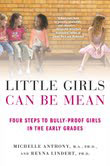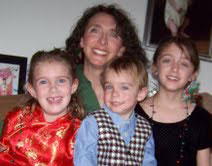
Protect your kids from girls gone mean
If you’ve got girls, you’re likely going to worry about the eventual mean girl experience. But it turns out the social problems and bullying may not be so far away. Mean girl behavior can start as young as kindergarten and it needs to be nipped as early as possible, according to Michelle Anthony, M.A., Ph.D., co-author of Little Girls Can Be Mean, Four Steps to Bully-Proof Girls in the Early Grades, and co-founder of Wide-Eyed Learning, LLC. The Centennial, Colorado-based mom of three, co-wrote Little Girls Can Be Mean to help guide parents through the social challenges of elementary-aged girls.
Why do you believe that the focus of girl aggression on middle and high school students is a problem?
 Dr. Michelle Anthony: Starting to focus on girl aggression in middle and high school is way too late in the game. By the time they’re in middle school, a majority of girls will have faced or witnessed countless acts of social cruelty and relational aggression.
Dr. Michelle Anthony: Starting to focus on girl aggression in middle and high school is way too late in the game. By the time they’re in middle school, a majority of girls will have faced or witnessed countless acts of social cruelty and relational aggression.
Knowing how many girls need to learn to deal with these struggles was the reason Dr. Reyna Lindert and I wrote Little Girls Can be Mean. We wanted to help parents and other caring adults understand how and why meanness happens, and have a plan for what to do about it.
Pushing for power
What kind of female relational aggression exists in grade school?
Dr. Anthony: If you had to stereotype, girls more often use social power — what researchers call relational aggression or social cruelty — to bully their peers. Boys, in contrast, use physical intimidation. While the initial “blow” from a girl bully may seem less severe than the physical abuse sustained by a boy bully, the sting and its aftermath lasts much longer, and tends to involve more people.
Elementary-aged girls are actively trying to have power within relationships. Unfortunately, girls this age often don’t know how to make themselves more powerful without it being at the expense of another . This is incidental or accidental meanness. However, usually beginning around third grade, they discover how to use negative power, and the amount of intentional meanness increases . Without guidance early on, you get the double whammy of two kinds of meanness that only grows as girls age, in both amount and magnitude.
Needing a guide
People often see the grade school years as an innocent, happy time, but what do parents need to know about the struggles of elementary-aged girls?
Dr. Anthony: So many parents learn the hard way that girls are already facing social cruelty, from as early on as kindergarten. This is when the meanness starts, and this is when we can best support girls to respond to it and cope with it, because this is the age when girls still look up to their parents and teachers. The truth is, there are many social situations that are not solved with a simple, “Please don’t do that,” kind of interaction.
What are some of the strategies you offer in your book, Little Girls Can Be Mean, to help young girls deal with tough social situations?
 Dr. Anthony: Girls will sometimes act very meanly, but at the heart of it, they are not mean girls. They are, more often than not, nice girls who don’t have enough tools to be assertive without slipping into being aggressive. Most children will need to learn to cope with meanness, and most will act in mean ways toward friends at some point or another.
Dr. Anthony: Girls will sometimes act very meanly, but at the heart of it, they are not mean girls. They are, more often than not, nice girls who don’t have enough tools to be assertive without slipping into being aggressive. Most children will need to learn to cope with meanness, and most will act in mean ways toward friends at some point or another.
Realize that whether your daughter is a target, bystander, or mean girl, she is trying to fit in and find power in her relationships, and that she is doing the best she can with the skills she has. That’s when you can come in with the Four Steps and help her move forward from there:
Step 1: Observe your child in new ways and with new eyes, seeking to understand who she is socially. Recognize when things go awry — she suddenly stops liking favorite activities, starts more fights, complains of illness, etc.
Step 2: Connect with her, without taking over. Ask questions; empathize. Let her know you are on her side before switching into problem-solving mode.
Step 3: Guide her. Work together to create a doable list of possible actions she can take.
Step 4: Support her to act on one or two of the actions that she chooses. Be an interested but not overly invested observer and follow up with the Four Steps again to see if more connection, guidance or support to take new actions is warranted.
![]() Hey, Moms
Hey, Moms
How do you offer guidance against mean girl behavior? Share your thoughts and stories in Comments below.
Read more expert parenting advice
Parenting Guru: Can girls dodge the drama years?
Parenting Guru: What it takes to make friends
Parenting Guru: When you stop enabling